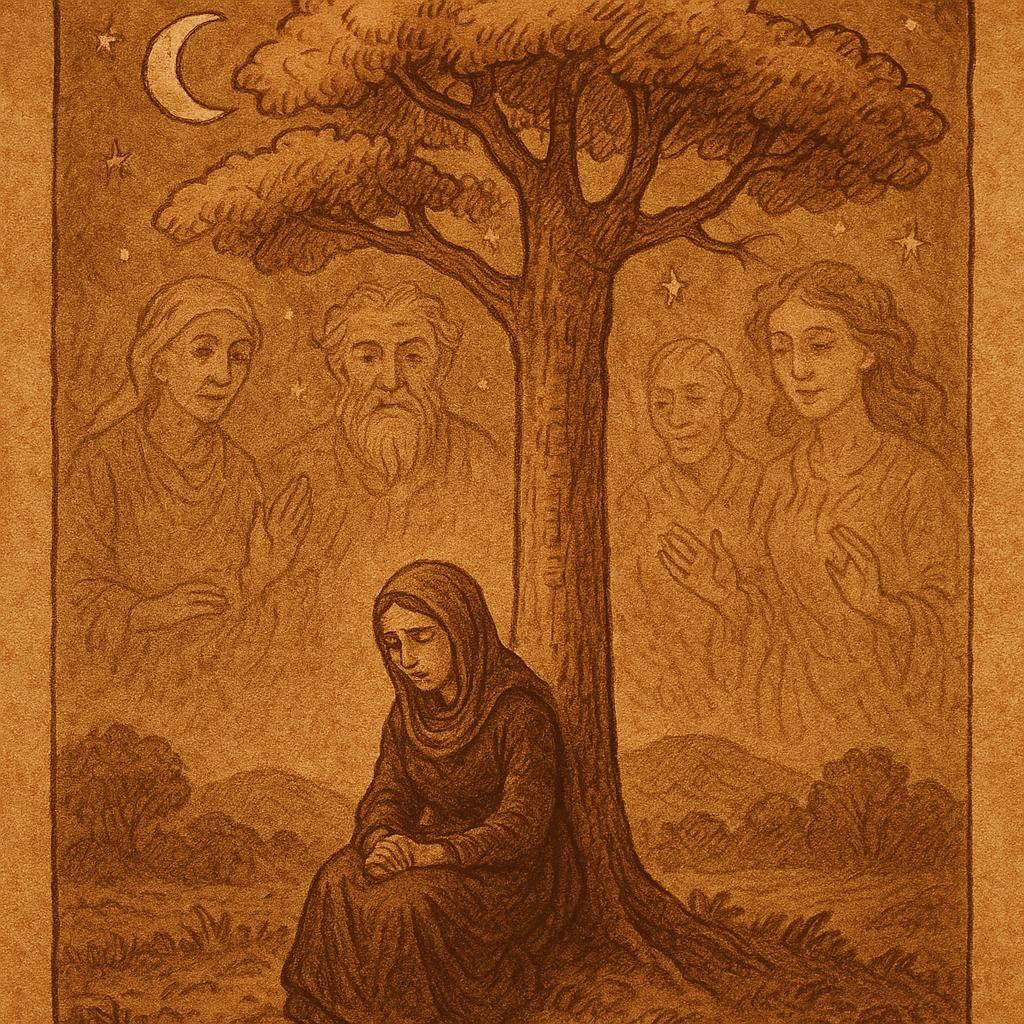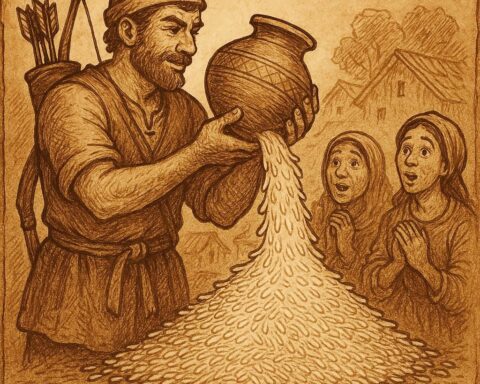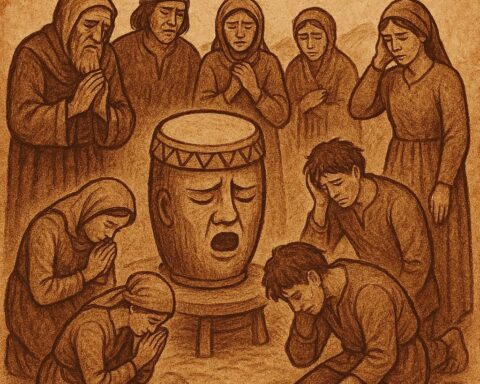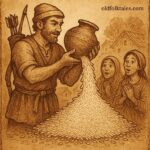Long ago, in the green valleys where the Mende people built their homes, there lived a woman named Satta. She was a widow, for her husband had been taken by illness, leaving her to care for her only son. Though her heart was heavy, she carried herself with quiet dignity, working hard in her farm plots and joining the other women at the river to wash clothes, sing, and share stories.
Life in the village was not always easy. Some years, the rains did not come as they should, and the crops shriveled in the fields. Other years, storms destroyed what little harvest the people had. In such times, villagers turned to their elders and diviners for guidance, for they believed the spirits of the ancestors could bring wisdom to the living.
One evening, after a long day, Satta wandered into the forest, seeking comfort from her grief. She sat beneath a tall silk-cotton tree and cried softly, calling out to her husband. “If you can hear me in the land of spirits, give me strength. Our son needs me, and our people suffer.”
READ THIS : The Fisherman and the Ungrateful Crocodile
As the moon rose above the branches, a strange silence fell. Then a soft voice whispered in the wind. At first, Satta trembled, thinking a wild spirit had come to harm her. But the voice was calm and familiar. “Do not fear,” it said. “We are the ancestors. Your sorrow has reached us. Because of your faith and strength, we grant you the power to speak with us.”
From that night, Satta could hear the voices of the departed. They came to her in the stillness of night and in the rustle of leaves by day. The spirits did not speak of death or fear but offered wisdom about the living world. They taught her which plants could heal sickness, which streams carried clean water, and which sacrifices would bring blessings from the unseen.
When famine struck the village and the people grew desperate, Satta shared what she had learned. She told the farmers when to sow their seeds, guided hunters to safe paths, and instructed the women on how to store food against hunger. At first, some doubted her, but when her words proved true, even the chief listened to her counsel.
The people soon realized that their survival depended on the widow who spoke with ghosts. Satta’s strength was not in muscle or wealth, but in her gift of listening to voices that others could not hear. With her guidance, the famine eased, and the village flourished again.
Yet power always draws questions. Some feared her abilities, whispering that a woman with such gifts must be dangerous. Others wondered if she had made secret pacts with dark spirits. But Satta stood firm. She reminded her people, “The ancestors do not choose lightly. They chose me because I am one of you, and I use their wisdom only for our good.”
Her words brought peace, and the people honored her as a mother of the village. For many years, she served as a bridge between the living and the dead. When disputes arose, she asked the ancestors for guidance. When sickness spread, she found remedies in their whispers. When children cried in hunger, she shared their voices with the spirits, who answered with blessings of rain and fertile soil.
Satta grew old, her hair silver like moonlight, but her gift never left her. On her final night, she gathered her son and the elders of the village and said, “Do not mourn me when I join the ancestors. I will still speak to you, as I have always done. Listen closely to the wind, the trees, and the quiet of the night. Our people are never truly alone.”
And so she passed into the spirit world, but the villagers believed her voice lingered in the forest, guiding them whenever hardship came. To this day, the Mende people tell her story, reminding daughters and sons alike that women carry strength not only in their hands but also in their wisdom, their faith, and their courage to speak.
Moral Lesson
The story of The Woman Who Spoke with Ghosts teaches that true strength does not always come from wealth, force, or position, but from the wisdom to guide and protect others. It shows the power of women in community life and how listening to the voices of the past can safeguard the future. Pride fades, but wisdom endures across generations.
Knowledge Check
Who was Satta in the folktale The Woman Who Spoke with Ghosts?
She was a widow who gained the power to speak with spirits after praying to her ancestors in her grief.How did Satta first receive the gift of speaking with the dead in The Woman Who Spoke with Ghosts?
The ancestors heard her prayers under the silk-cotton tree and granted her the ability to hear their voices.What wisdom did the ancestors share with Satta in The Woman Who Spoke with Ghosts?
They taught her about healing plants, clean water, farming seasons, and sacrifices to bring blessings.How did Satta use her gift to save her people in the folktale The Woman Who Spoke with Ghosts?
She guided farmers, hunters, and mothers with ancestral wisdom, protecting the village from famine.What challenges did Satta face because of her gift in The Woman Who Spoke with Ghosts?
Some people feared her powers and doubted her, thinking her gift might come from dark spirits.What is the main moral lesson of The Woman Who Spoke with Ghosts?
The moral is that true strength comes from wisdom, courage, and service to others, not from pride or force.
Source: Mende folktale, Sierra Leone. Recorded by Kenneth C. Wylie in Myth and Mythology of the Mende (1980).






